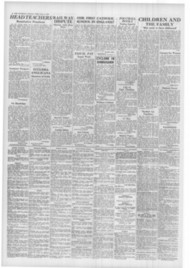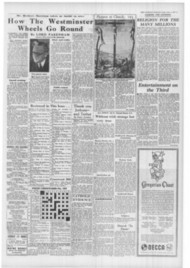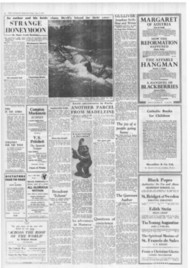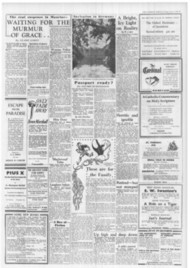Page 3, 4th June 1954
Page 3

Report an error
Noticed an error on this page?If you've noticed an error in this article please click here to report it.
Tags
Share
Related articles
The Sad Fact Made Fiction Very Dull
We Like The Familiar
Looking And Listening
New On The Radio
Radio
Entertainment on the Third
RADIO. Perhaps it was rather much to expect that Henry Reed should hit the bell quite so definitely with his "Private Life of Hilda Tablet" (Third Programme) as he did with "A Very Great Man Indeed." All the same, it was splendid entertainment and one still clamours for more of the same kind.
The defects in this second showthey are defects in comparison onlyseemed to me to be that the characters had become more familiarly "types" than they were before, that the satire was slightly less sharp, and that some episodes, such as the "drunk" scene at Hilda's school, were rather too long drawn out. Mary O'Farrell as Hilda, the modern composeress, was as hearty and vigorous as ever but not quite as real as before-less Waugh and more Wodehouse. Herbert Reeve, the scholar through whose reminiscences we become acquainted with all these odd people, was still a deliciously wide-eyed and dedicated Boswell; but in the earlier show his approach was more "dead-pan," more Third Programme, and consequently he came out more amusingly in contrast with the astonishing goings-on in which he gets himself involved,
I hope we shall have more of one gorgeous new character, Deryck Gyler as the Rector of Mull ExtrinSeCa.
Donald Swann's clever musical parodies, which naturally had more scope this time, lived up to all expectations. And that brings me on to
the unhappy case of Marjorie Westbury, who was so impressive as Elsa Strauss, Hilda's long-suffering singer -"Throw yourself at the note if you like, but for heaven's sake don't hit it!"-that I am now quite unable to think of her as anything else.
She took me right back to Hilda's studio during Saturday's programme (Light) for children under five, in which she was singing some of those fresh and experimental pieces that Ann Driver has been introducing into these broadcasts, which supplement the "Listen with Mother" series. I much admire Ann Driver's adventurous approach to what could easily become a very routine job, and I'd like to know how mothers find their children react to the more modern nursery songs she is making known-notably "Wind Chimes" and "Sweetly Sings the Donkey."
With four successive under-fives, have listened to these programmes ever since they started, and they are on the whole very good; but I have been wondering recently if it is not a fault in them that the mothers of the daily stories are so completely and unvaryingly sweet, patient. unfussed and ready to drop everything to find a tin for this infant project or some drawing paper for that.
The families in the stories are always small, but even so, can normal mothers with as few, say, as two children, be quite so much at their beck and call as these mothers are? And would it be a good thing for the children if they were?
Joan Newton
blog comments powered by Disqus












